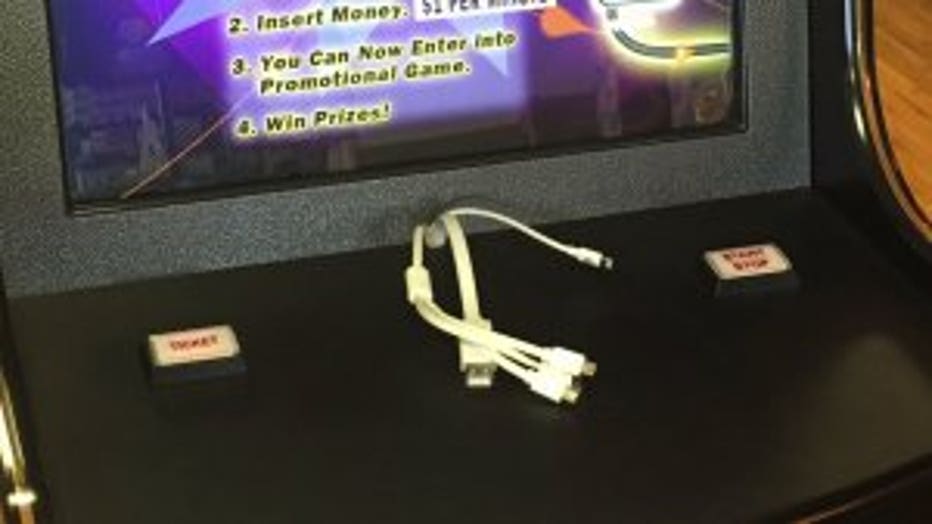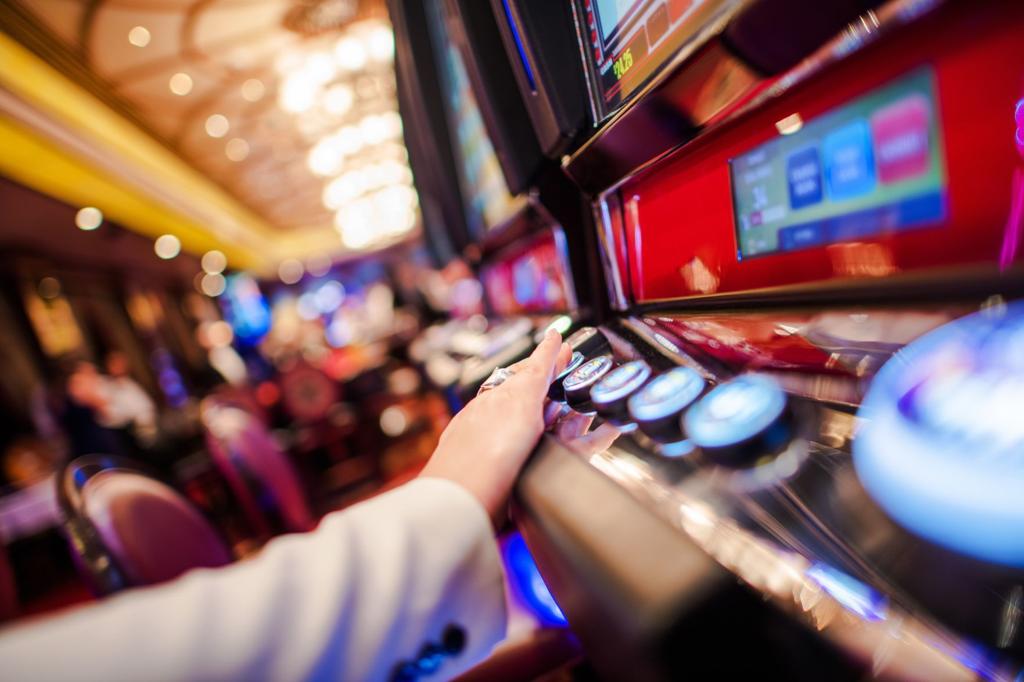How Do Illegal Gambling Machines Work
The very few times in gambling history when someone found slot secrets and hacks to win every time they played, they didn't do it because they found 'a system' to win at slots every time or because they knew how to pick a winning slot machine. They used illegal slots hacks or exploited faulty machines to win money. And that's illegal. Machines, Cherry Masters, or anything with a random number generator. Are all slot machines illegal? Slot machines are electronic gambling devices. Possessing and selling slot machines are illegal. However, you may possess an antique slot machine. Antique slot machines are at.
The gaming industry is big business in the U.S., contributing an estimated US$240 billion to the economy each year, while generating $38 billion in tax revenues and supporting 17 million jobs.
What people may not realize is that slot machines, video poker machines and other electronic gaming devices make up the bulk of all that economic activity. At casinos in Iowa and South Dakota, for example, such devices have contributed up to 89 percent of annual gaming revenue.
- The definition of legal gambling usually requires a specific state’s reference. In Nevada, most forms of gambling are legal where all other states may consider the activity illegal. Most legal gambling throughout the entire United States occurs through state lotteries, scratch off stickers, bingo and similar forms of monetary exchanges.
- So-called “no-chance” gaming machines are popping up at convenience stores and gas stations across the state, mostly in rural areas. They look and act like the slot machines you can find at any.
Spinning-reel slots in particular are profit juggernauts for most casinos, outperforming table games like blackjack, video poker machines and other forms of gambling.
What about slot machines makes them such reliable money makers? In part, it has something to do with casinos’ ability to hide their true price from even the savviest of gamblers.

The price of a slot
An important economic theory holds that when the price of something goes up, demand for it tends to fall.
But that depends on price transparency, which exists for most of the day-to-day purchases we make. That is, other than visits to the doctor’s office and possibly the auto mechanic, we know the price of most products and services before we decide to pay for them.
Slots may be even worse than the doctor’s office, in that most of us will never know the true price of our wagers. Which means the law of supply and demand breaks down.
Casino operators usually think of price in terms of what is known as the average or expected house advantage on each bet placed by players. Basically, it’s the long-term edge that is built into the game. For an individual player, his or her limited interaction with the game will result in a “price” that looks a lot different.
For example, consider a game with a 10 percent house advantage – which is fairly typical. This means that over the long run, the game will return 10 percent of all wagers it accepts to the casino that owns it. So if it accepts $1 million in wagers over 2 million spins, it would be expected to pay out $900,000, resulting in a casino gain of $100,000. Thus from the management’s perspective, the “price” it charges is the 10 percent it expects to collect from gamblers over time.
Individual players, however, will likely define price as the cost of the spin. For example, if a player bets $1, spins the reels and receives no payout, that’ll be the price – not 10 cents.
So who is correct? Both, in a way. While the game has certainly collected $1 from the player, management knows that eventually 90 cents of that will be dispensed to other players.
How Do Illegal Gambling Machines Work At Home
A player could never know this, however, given he will only be playing for an hour or two, during which he may hope a large payout will make up for his many losses and then some. And at this rate of play it could take years of playing a single slot machine for the casino’s long-term advantage to become evident.
Short-term vs. long-term
This difference in price perspective is rooted in the gap between the short-term view of the players and the long-term view of management. This is one of the lessons I’ve learned in my more than three decades in the gambling industry analyzing the performance of casino games and as a researcher studying them.
Let’s consider George, who just got his paycheck and heads to the casino with $80 to spend over an hour on a Tuesday night. There are basically three outcomes: He loses everything, hits a considerable jackpot and wins big, or makes or loses a little but manages to walk away before the odds turn decidedly against him.
Of course, the first outcome is far more common than the other two – it has to be for the casino to maintain its house advantage. The funds to pay big jackpots come from frequent losers (who get wiped out). Without all these losers, there can be no big winners – which is why so many people play in the first place.
Specifically, the sum of all the individual losses is used to fund the big jackpots. Therefore, to provide enticing jackpots, many players must lose all of their Tuesday night bankroll.
What is less obvious to many is that the long-term experience rarely occurs at the player level. That is, players rarely lose their $80 in a uniform manner (that is, a rate of 10 percent per spin). If this were the typical slot experience, it would be predictably disappointing. But it would make it very easy for a player to identify the price he’s paying.
Raising the price
Illegal Gambling Machines In Missouri
Ultimately, the casino is selling excitement, which is comprised of hope and variance. Even though a slot may have a modest house advantage from management’s perspective, such as 4 percent, it can and often does win all of George’s Tuesday night bankroll in short order.
This is primarily due to the variance in the slot machine’s pay table – which lists all the winning symbol combinations and the number of credits awarded for each one. While the pay table is visible to the player, the probability of producing each winning symbol combination remains hidden. Of course, these probabilities are a critical determinant of the house advantage – that is, the long-term price of the wager.
This rare ability to hide the price of a good or service offers an opportunity for casino management to raise the price without notifying the players – if they can get away with it.
Casino managers are under tremendous pressure to maximize their all-important slot revenue, but they do not want to kill the golden goose by raising the “price” too much. If players are able to detect these concealed price increases simply by playing the games, then they may choose to play at another casino.
This terrifies casino operators, as it is difficult and expensive to recover from perceptions of a high-priced slot product.
Getting away with it
Consequently, many operators resist increasing the house advantages of their slot machines, believing that players can detect these price shocks.
Our new research, however, has found that increases in the casino advantage have produced significant gains in revenue with no signs of detection even by savvy players. In multiple comparisons of two otherwise identical reel games, the high-priced games produced significantly greater revenue for the casino. These findings were confirmed in a second study.
Further analysis revealed no evidence of play migration from the high-priced games, despite the fact their low-priced counterparts were located a mere 3 feet away.
Importantly, these results occurred in spite of the egregious economic disincentive to play the high-priced games. That is, the visible pay tables were identical on both the high- and low-priced games, within each of the two-game pairings. The only difference was the concealed probabilities of each payout.
Armed with this knowledge, management may be more willing to increase prices. And for price-sensitive gamblers, reel slot machines may become something to avoid.
The main difference between legal and illegal gambling is that legal gambling is monitored by government inspections agencies. But more people gamble because it is legal, and although the government collects taxes on jackpots, Indian casinos and lotteries, the system is highly subject to fraud.
Gambling online is illegal (federally), but this doesn’t stop people from doing it. And even though the Organized Crime Section of the Department of Justice found that “the rate of illegal gambling in those states which have some legalized form of gambling was three times as high as those states where there was not a legalized form of gambling,” we still believe that gambling is a drain to society. Here are our Top 5 reasons why.
Reasons why gambling should be illegal
1. Gambling is subject to fraud.
Legalized gambling, specifically Indian gaming, is the fastest growing industry in the world, and can have a corrupting influence on state government. The governments are addicted to the revenue received from Indian gaming and lotteries. Recently there have been numerous news reports of corruption and fraud in state lotteries.


2. Availability of gambling facilities increases risk of problem gambling.
Legalized gambling makes this activity available to too many people. Governments and casinos portray this as a harmless form of entertainment. Because of the availability of legalized gambling, it is more addictive and destructive than most other addictions.
Furthermore, most citizens would not gamble illegally. Legalized gambling, therefore, entices people to gamble, who normally would not gamble at all. In states with different numbers of games, participation rates increase steadily and sharply as the number of legal types of gambling increases. In fact, legalized gambling in various states has not been a competitor to, but rather has become a stimulator of illegal gambling.
The public is assured they have the potential to win a huge jackpot. All that is required is to drive to the casino or purchase a lottery ticket. Because of the availability of gambling, many gamblers become addicted and compulsive. Interested in how to quit gambling? Read more here.
3. Problem gambling costs society billions annually.
The social costs of gambling addictions will eventually impact careers, physical and mental health issues, bankruptcy, divorce, crimes, and treatment. The gamblers will eventually rely on welfare or unemployment benefits, impacting the government, and the costs could reach several billions of dollars per year.
4. Gambling exploits the poor.
Evidence shows that legalized gambling often hurts and even destroys, especially those who are poor and disadvantaged. If gambling were illegal, the gambling venues would not be able to promote their lotteries, casinos, or other forms of betting and exploit people who are most vulnerable.
5. Gambling sets a double standard for governments.
State lotteries are argueably an effective way to raise taxes. Legalized gambling is a disturbing governmental policy. Governments should promote desirable qualities in the citizens and not seduce them to gamble in state-sponsored vice. When this occurs, the government contributes to the corruption of society.
Legalized gambling is a bad social policy. At a time when independent organizations estimate that there are at least 12 million compulsive gamblers, it does not make a lot of sense to have the state promoting gambling. State sponsorship of gambling makes it harder, for the compulsive gambler to reform.
Compulsive gambling costs
In addition to the above reasons for making gambling illegals, are the economic costs that gamblers themselves incur. The average compulsive gambler has debts exceeding $80,000. Additionally, compulsive gamblers affect the lives of family, friends, and business associates. Some of the consequences of gambling include marital disharmony, divorce, child abuse, substance abuse, and suicide attempts. Other social costs surface because of family neglect, embezzlement, theft, and involvement in organized crime.
Crossing our fingers or wishing on a star will not guarantee a win. The only guarantee is, if a person is a compulsive gambler and continues to gamble, the end result is prison, insanity, or death. Whether gambling is legal or illegal, there will always be gamblers. Wanna bet?